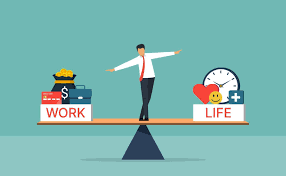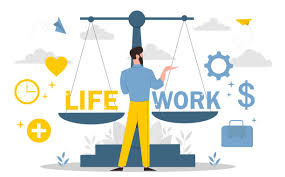Importance of social awareness in work-life balance:

In this 21st century, the digital revolution has undoubtedly made it easier to work anytime and anywhere. Consequently, while this flexibility is a significant benefit, it has also created an “always-on” culture that can be overwhelming. Moreover, remote work and freelancing often blur the line between personal and professional life, thereby making it increasingly difficult to maintain a healthy work-life balance.
In addition, constant notifications and late-night emails further add to the stress, which highlights the importance of social awareness in work-life balance. This awareness encourages individuals and organizations alike to prioritize mental well-being and respect personal boundaries. Therefore, it is crucial for society to recognize that technological progress should never come at the cost of mental health, personal boundaries, and overall well-being.
Understanding Work-Life Balance in Family and Relationships:
Maintaining a healthy work-life balance is key to ensuring that neither our careers nor our personal lives are compromised. Nevertheless, in today’s fast-paced digital world, achieving that balance takes more than just individual effort. Indeed, it also requires a broader shift—one rooted in collective social awareness and real changes in how workplaces are structured.
To clarify, work-life balance means creating a healthy rhythm between professional responsibilities and personal time. Fortunately, thanks to increased social awareness, we’re now seeing a positive shift toward more family-friendly policies, such as parental leave, flexible work-from-home options, and support for caregivers. However, here’s the thing: these changes are just the beginning.
In order to truly make a difference, we need to continue pushing for policies that support people’s well-being both at work and at home. Ultimately, it is through sustained effort and cooperation that we can build a more balanced and humane professional culture., it includes:
- Having time for family and relationships
- Pursuing hobbies and interests
- Engaging in physical activities
- Resting and rejuvenating
Mental Health and why Digital Detox is Important:
One of the most serious consequences of a poor work-life balance is the mental health. More specifically, conditions like anxiety, depression, and chronic stress are becoming increasingly common—particularly among remote workers and professionals in high-pressure industries. At this point, social awareness plays a crucial role. Through awareness campaigns, workplace mental health initiatives, and community support networks, we can begin to break the stigma and encourage individuals to seek help without fear or shame.
Fortunately, the growing openness around mental health in professional environments is a direct result of this rising social consciousness—and it’s something we must continue to foster. In addition, incorporating digital detoxes into our social awareness efforts is essential. Encouraging people to unplug from their screens not only helps reduce stress but also boosts productivity over time. Put simply, a digital detox is a period when individuals intentionally disconnect from digital devices to unwind and reconnect with real-life experiences—a practice that’s more necessary now than ever. It can include:
- Practicing mindfulness or engaging in nature activities
- Logging off social media for a few days
- Turning off notifications after work hours
- Scheduling tech-free family time
The Employer’s Role in Promoting Balance:
Clearly, these initiatives stem from a deep social awareness of the human aspect of work. In fact, progressive companies that prioritize well-being witness lower turnover rates, higher job satisfaction, and enhanced team morale. Moreover, employers hold significant power in shaping the work culture of their organizations. By fostering supportive environments, they can directly influence both employee happiness and overall productivity.Their responsibilities include:
- Providing employee wellness programs
- Offering flexible work schedules
- Implementing paid time off policies
- Encouraging mental health days
The Employee’s Role and Personal Responsibility:
To begin with, self-discipline combined with social awareness leads to better lifestyle choices. Additionally, understanding the impact of one’s habits on family, society, and mental health is an integral part of personal development. While systemic support is crucial, it is equally important to note that individuals also play a role in creating balance. Therefore, achieving a harmonious life requires both personal responsibility and collective effort. This includes:
- Saying “no” when overwhelmed
- Prioritizing self-care
- Learning time management skills
- Practicing mindfulness and stress reduction techniques
Educational Institutions and Early Awareness:
Instilling social awareness in students ensures that future professionals are more conscious of their work-life dynamics. They will grow into individuals who value balance, respect personal boundaries, and advocate for well-being. The foundation for work-life balance should be laid early. Educational institutions can:
- Include mental health and lifestyle education in curricula
- Promote extracurricular activities for holistic development
- Teach time management and digital etiquette
Cultural Shifts and Changing Norms:
Cultures that glorify overworking—often termed “hustle culture”—are slowly being questioned. Movements like “quiet quitting” and “anti-hustle” trends reflect a change in mindset.
These shifts are driven by increasing social awareness about the value of rest, joy, and human connection. People are realizing that productivity should not come at the cost of health and happiness.
Some are below Outbound Links for Social Awareness in Work-Life Balance:
- Mental Health America – Work-Life Balance
Offers practical tips on balancing work and life and emphasizes the role of mental health.
👉 https://mhanational.org/resources/work-life-balance - World Health Organization – Mental Health in the Workplace
Discusses how workplace environments affect mental health and the need for supportive, aware policies.
👉 https://www.who.int/news-room/fact-sheets/detail/mental-health-at-work - Harvard Business Review – Resilience and Work-Life Balance
A thought leadership piece on how organizations can foster resilience and well-being.
👉 https://hbr.org/2020/05/what-resilience-means-and-why-it-matters - LinkedIn Article – How Social Awareness Enhances Work-Life Balance
A professional take on using emotional intelligence to navigate modern work demands.
👉 https://www.linkedin.com/pulse/how-does-social-awareness-help-you-your-work-life-teal-watson - Society for Human Resource Management (SHRM) – Work-Life Integration
Explores how HR policies can support employees with flexible, balanced working structures.
👉 https://www.shrm.org/resourcesandtools/hr-topics/employee-relations/pages/work-life-balance.aspx
Community and Peer Support:
Communities driven by social awareness become safe spaces where people can share their struggles and solutions. This collective support amplifies the positive impact. Communities play a crucial role in supporting individuals striving for balance. Peer groups, online forums, and local organizations can:
- Organize well-being workshops
- Share resources and advice
- Offer emotional support
- Advocate for better work-life standards
Measuring Success Beyond Productivity:
The metrics of success are evolving due to rising social awareness. There’s growing recognition that a truly successful life includes rest, purpose, and connection. In the digital age, success should not be measured solely by how much one works, but also by:
- Overall happiness
- Quality of relationships
- Emotional and physical health
- Contribution to society
Setting Boundaries in the Digital Workspace and Call to Action:
Boundaries are crucial in maintaining work-life balance. Let’s build a future where technology enhances life rather than controls it. Begin with small steps:
- Log off when your workday ends
- Setting fixed working hours
- Organize a short vacation with a family & friends.
- Prioritize time with loved ones
- Communicating availability clearly to colleagues
- Avoiding work communication during personal time
- Encourage your workplace to adopt wellness policies
- Talk about mental health openly
Conclusion:

Therefore, balancing work and life in the digital age is not just a personal challenge but, more importantly, a societal one. While technology continues to shape our lifestyles, but the human need for balance remains constant.
Therefore, the path forward requires a fusion of self-discipline, organizational empathy, and cultural transformation. Central to this shift is the importance of social awareness in work-life balance, which ensures that individuals and institutions alike recognize the value of well-being alongside productivity.
Consequently, from employers and educators to governments and communities, everyone has a role to play in redefining success, protecting mental health, and ensuring that life in the digital age is not just efficient but also fulfilling.
With consistent efforts and collective awareness, we can create a world where balance is not a luxury but a norm.
